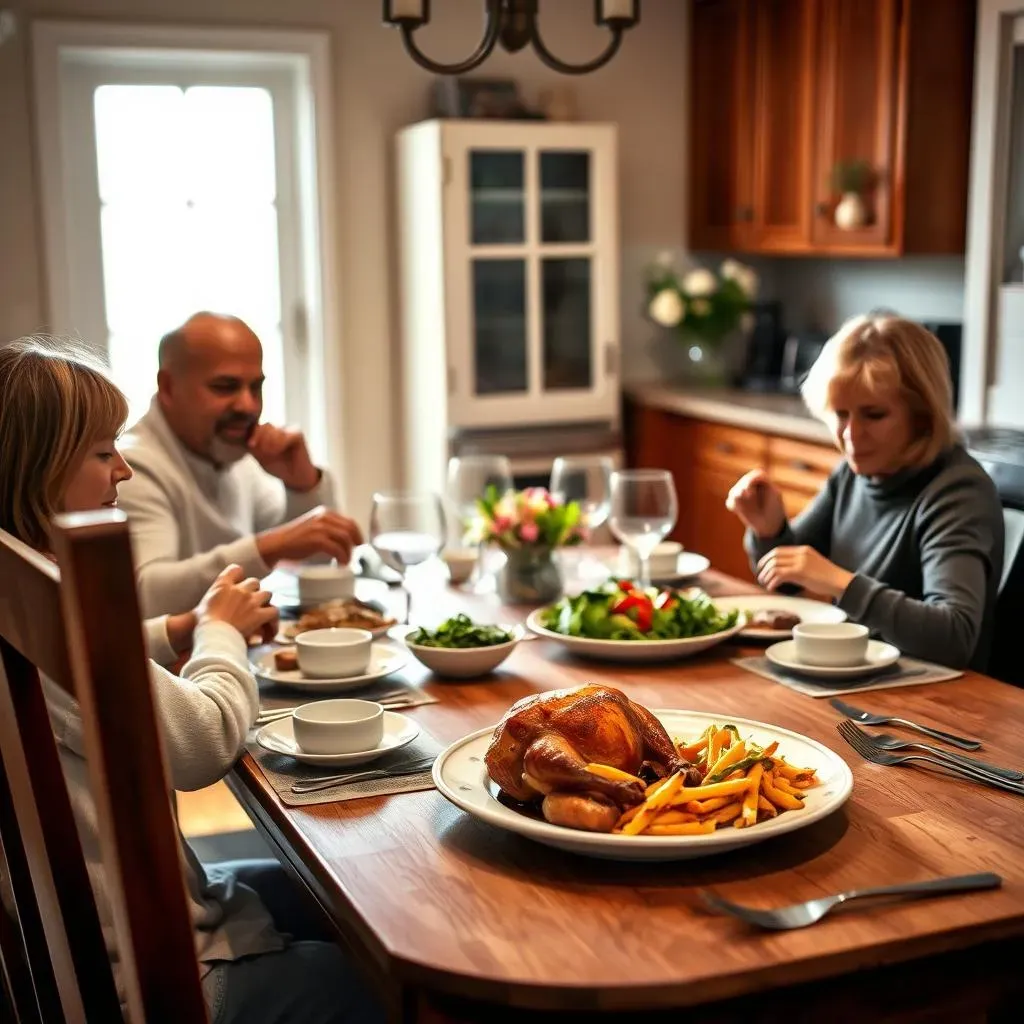Table of Contents
Ever found yourself staring at the clock, wondering if it's too late to eat dinner? Or maybe you're just curious about this whole "meal timing" thing. Well, you're not alone! We often hear about *what* to eat, but the question of *when* is just as important. The timing of your meals, especially dinner, can significantly impact your overall health, sleep, and even your weight. It's not about strict rules or complicated schedules, but about finding what works best for your body and lifestyle. This article will walk you through the best times to eat, focusing on the all-important dinner hour. We'll explore why timing matters, and how to adjust your eating schedule for better health. We'll also look at the role of snacks and whether time-restricted eating might be a good fit for you. So, if you're asking yourself, "when is it healthy to eat dinner?", let's get started and find the answers together.
The Mealtime Balancing Act: When is it Healthy to Eat Dinner?

The Mealtime Balancing Act: When is it Healthy to Eat Dinner?
Why Timing Matters: More Than Just a Clock
so you're wondering about the best time to eat dinner, right? It's not just about fitting it into your schedule. When you eat can really mess with your body's rhythm, especially if you're a late-night snacker. Eating too close to bedtime can throw off your digestion and even make it harder to get a good night's sleep. Think of your body like a car; you wouldn't fill it up with gas right before parking it for the night, would you? The same logic applies to your meals. Eating too late often means you're opting for quick, less-than-healthy choices, which can pack on extra pounds over time. It's like a domino effect – late dinner, poor sleep, and then unhealthy choices the next day. So, paying attention to timing is about more than just being punctual; it's about respecting your body's natural processes.
I used to think dinner time was just whenever I was done with work. I’d grab something quick and call it a day. But then I started feeling sluggish, and my sleep was terrible. I realized that my late dinners were a big part of the problem. So I began experimenting with eating earlier, and wow, what a difference it made! I had more energy, and I actually started sleeping through the night. It wasn't a magic bullet, but it was a big step in the right direction.
Finding Your Sweet Spot: Not a One-Size-Fits-All Approach
Now, there's no magic number for the best dinner time. It really depends on your daily routine, your body's signals, and your health goals. Some people swear by eating dinner at 6 pm, while others prefer 8 pm or even later. What's key is listening to your body's cues. Are you actually hungry? Or are you just bored or stressed? If you’re having a large meal late at night, your body isn’t going to be able to digest it effectively before you go to sleep. This can lead to discomfort, indigestion, and a poor night’s rest. Ideally, you want to aim for eating dinner at least three hours before you hit the hay. This gives your body enough time to digest your food properly and prepare for sleep. You should avoid eating or drinking anything other than water after your dinner, at least 2-3 hours before sleeping
I've noticed that when I eat dinner earlier, I feel much lighter and have better energy for my evening activities. It's not about being super strict, but finding a rhythm that works for me. Sometimes, life throws curveballs, and a late dinner is inevitable, and that’s okay. The real trick is to make better choices when those late-night meals happen. If you are going to eat a late dinner, consider making lunch your largest meal of the day. This way, you’re not loading up on calories right before bed.
Meal | Ideal Timing | Why it Matters |
|---|---|---|
Dinner | At least 3 hours before bed | Allows for proper digestion & better sleep. |
Late Dinner | When unavoidable | Make healthy choices, make lunch your largest meal |
Snacking Smart: When to Eat Between Meals

Snacking Smart: When to Eat Between Meals
The Snack Dilemma: Are They Really Necessary?
so we've talked about dinner, but what about those in-between munchies? Are they a must, or should we ditch them altogether? Honestly, snacking isn't always necessary. If you're eating balanced meals with enough protein and fiber, you might find that you don't need snacks at all. I know, it sounds crazy in our snack-obsessed world, but hear me out. The main reason we reach for snacks is often because we're not truly full from our meals or maybe we are bored. It's like, your body is whispering, "Hey, I need something," and we often interpret that as a need for a bag of chips. But, if you're eating enough protein and fiber at your regular meals, your hunger pangs might be less frequent.
I used to be a big snacker, always reaching for something between meals. I thought it was helping me keep my energy up. But then I realized I was just adding extra calories without really needing them. When I focused on making my meals more satisfying, I found that I didn't crave snacks as much. It was like a light bulb went off. It’s not about depriving yourself, but about tuning in to your body's real hunger signals. It is about understanding the difference between a real need for food and just boredom.
Smart Snacking Choices: Fueling Your Body Right
But let's be real, sometimes we do get hungry between meals, and that's perfectly fine. The key is to make smart choices. Instead of grabbing processed junk, go for something that actually nourishes your body. Think fruits, nuts, or maybe a small serving of yogurt. These options provide nutrients and fiber, which help keep you full until your next meal. It’s all about swapping out those empty calories for something that actually fuels you. It's like choosing high-octane fuel for your car instead of the cheap stuff. You wouldn't expect your car to run well on low-grade fuel, and it's the same with your body. So, when you do snack, make it count.
I always have some almonds or a piece of fruit handy for those moments when I feel a little peckish. It's a simple change, but it makes a big difference. It's not about being perfect but about making better choices most of the time. And remember, pay attention to your hunger cues. Are you truly hungry, or are you just bored or stressed? Sometimes, a glass of water or a quick walk can do wonders to curb those cravings. It's all about understanding your body and giving it what it actually needs, not just what it craves.
Snack Type | Good Choices | Avoid |
|---|---|---|
Fruits | Apples, bananas, berries | Fruit juices |
Nuts & Seeds | Almonds, walnuts, chia seeds | Roasted & salted nuts |
Dairy | Greek yogurt, cottage cheese | Sugary yogurts |
TimeRestricted Eating: Is it Right For You?

TimeRestricted Eating: Is it Right For You?
What's the Buzz About Time-Restricted Eating?
so you've probably heard about time-restricted eating, or intermittent fasting, as some people call it. It's not a diet, but more of an eating pattern. The basic idea is that you shorten the window of time during which you eat each day. Instead of grazing all day long, you might eat within an 8-hour or 12-hour window, and then fast for the rest of the time. For example, you could eat between 10 am and 6 pm, and then fast until 10 am the next day. It's like giving your body a break from constantly digesting food. Some people swear by it, claiming it helps with weight loss and better health. But is it really for everyone? Let's look at it more closely.
I've experimented with time-restricted eating myself, and it's definitely been interesting. I started with a 12-hour eating window, and I found that it helped me be more mindful of when I was eating, instead of just snacking whenever. It wasn't a magic fix, but it did help me regulate my hunger and improve my energy. It's not about starving yourself, but about making your eating schedule more intentional. It’s like setting boundaries for when you eat, so your body knows when to expect fuel and when to rest. It’s about being consistent, not necessarily about being restrictive.
Is Time-Restricted Eating Your Cup of Tea?
Now, before you jump on the time-restricted eating bandwagon, it’s important to consider your own needs and goals. This approach isn't for everyone. If you have certain medical conditions, like diabetes or a history of eating disorders, it's crucial to consult with your doctor first. The key thing to remember is that it's not a race to see how little you can eat, but a way to potentially improve your overall health. Also, if you're someone who needs to eat more frequently due to their medical conditions, this approach may not be suitable. It’s all about finding a balance that works for you.
I've seen some people thrive on time-restricted eating, while others find it too difficult to stick with. It really comes down to your personal preferences and how well your body responds to it. The goal is to find a sustainable approach that fits into your lifestyle and helps you achieve your health goals. If you are constantly feeling hungry or deprived, then this approach may not be suitable for you. It is important to listen to your body and adjust as necessary. There is no one-size-fits-all approach to eating, and this is just one of the many options you can explore.
Time-Restricted Eating | Potential Benefits | Things to Consider |
|---|---|---|
Shortened Eating Window | Weight loss, improved insulin sensitivity | Not suitable for everyone, listen to your body |
Fasting Period | May improve digestion and sleep | Consult doctor if you have medical conditions |
Wrapping Up: Finding Your Ideal Dinner Time
Figuring out the best time to eat dinner isn't about following a rigid rulebook. It's about understanding how your body works and making choices that support your health and lifestyle. Whether you're an early bird or a night owl, the key is to be mindful of your hunger cues, prioritize whole foods, and allow your body enough time to digest before you hit the hay. If you are eating late, then don't eat a big meal, and consider making lunch your biggest meal. Experiment with different meal timings, pay attention to how you feel, and adjust as needed. Remember, there's no one-size-fits-all answer to "when is it healthy to eat dinner," so embrace the journey of finding what works best for you.